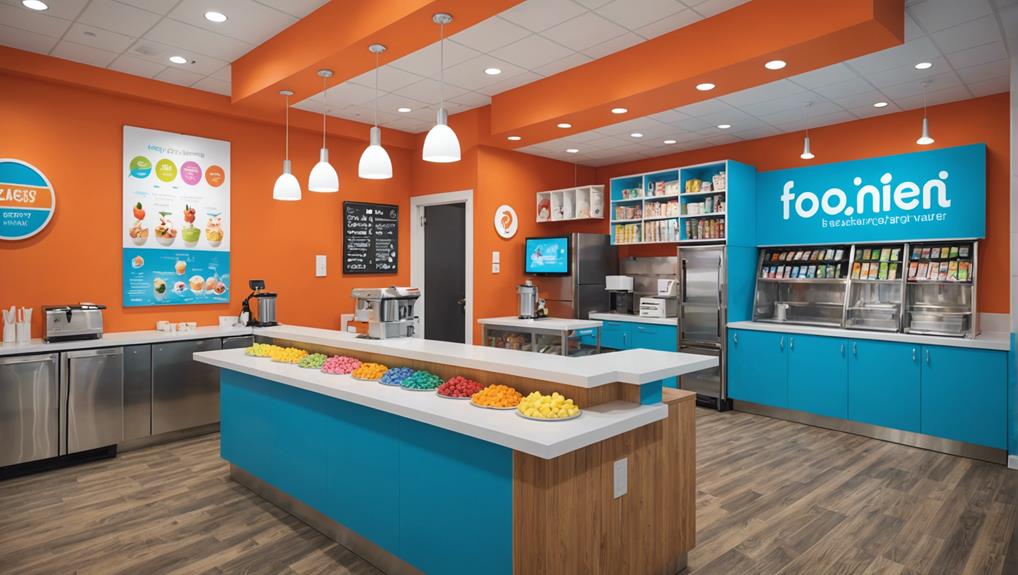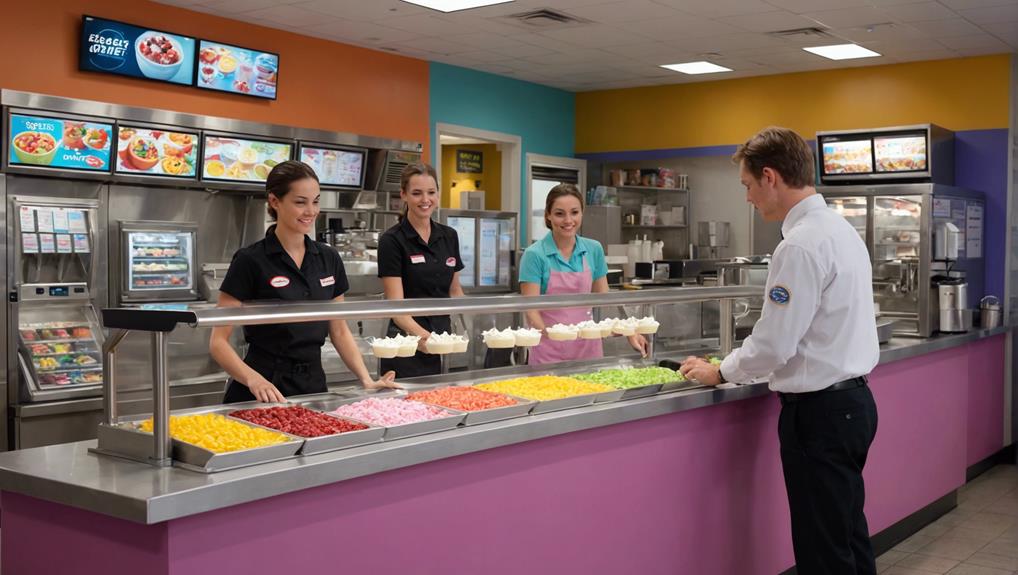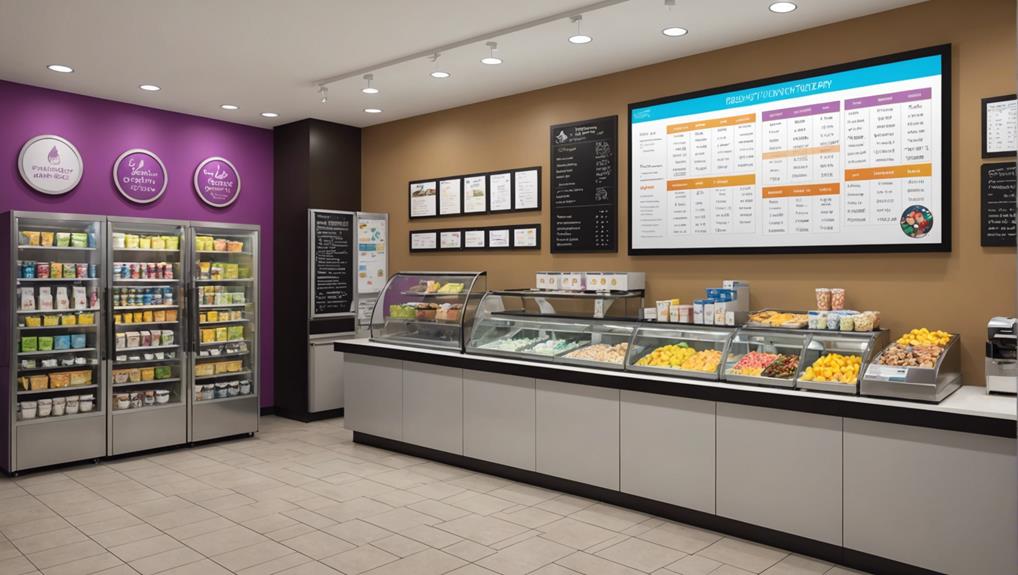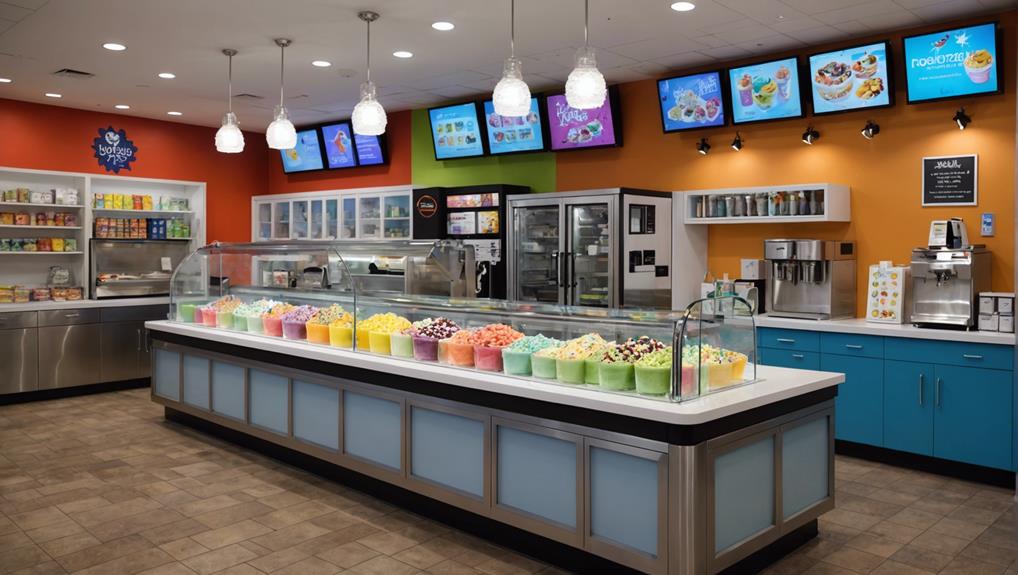Expanding your frozen yogurt franchise demands a vital strategy. Start with thorough market research to identify high-potential locations based on demographic trends and competitor analysis. Opt for high-traffic areas to guarantee consistent customer flow and visibility. Craft a unique brand presence by understanding local preferences and competitor offerings. Partner with reliable suppliers for essential products to maintain operational efficiency. Implement thorough staff training programs to guarantee exceptional service. Leverage data-driven marketing campaigns to attract and retain customers. Strategic financial planning is essential to balance costs and forecast growth. Discover more insightful strategies to successfully scale your franchise.
Key Takeaways
- Conduct demographic research to identify high-traffic areas and understand consumer preferences.
- Analyze competitors to identify market gaps and opportunities for unique selling points.
- Utilize thorough financial planning to predict revenue, expenses, and potential returns.
- Implement effective staff training programs to ensure operational efficiency and brand consistency.
- Leverage data-driven marketing campaigns to attract and retain customers through targeted promotions and loyalty programs.
Market Research

Conducting thorough market research is vital for identifying the best locations for new frozen yogurt franchise stores by analyzing consumer demand and demographic trends. By delving into the specifics of local demographics, such as age distribution, income levels, and lifestyle preferences, franchisors can guarantee their frozen yogurt offerings resonate with the target market. This analysis not only aids in ideal site selection but also in justifying the franchise fees by demonstrating a high potential for return on investment.
Moreover, competitor analysis is a critical component of market research. Understanding what other frozen yogurt and dessert shops offer, including their pricing strategies, helps in carving out unique selling points for the new franchise. This differentiation is essential for attracting a loyal customer base and standing out in a crowded market.
Market research also provides invaluable insights into consumer preferences, which can inform the development of tailored marketing strategies and product offerings. This strategic approach ensures that the franchise's expansion efforts are aligned with current consumer behavior and industry developments. Additionally, staying abreast of market trends and growth projections can guide long-term strategic decisions, further solidifying the franchise's foothold in new territories.
Location Selection
When selecting the best location for your frozen yogurt franchise, it is crucial to conduct thorough demographic research to understand your target market. Strategically choosing a high-traffic area can greatly enhance customer acquisition, while a thorough competitor analysis will help identify gaps and opportunities in the marketplace. Leveraging these insights guarantees that your franchise is positioned for maximum visibility and profitability.
Demographic Research Importance
Thorough demographic research is essential for determining the most advantageous location to expand your frozen yogurt franchise. A meticulous analysis of the frozen yogurt market through demographic research allows franchise owners to identify key factors such as population density, age demographics, income levels, and consumer behaviors. This enables a precise understanding of the local target market's preferences and spending habits, which is crucial for maximizing profitability.
In-depth demographic research reveals important insights about potential customers, including their likelihood to purchase frozen yogurt, frequency of visits, and preferred flavors. By examining these elements, franchise owners can tailor their marketing strategies and product offerings to align with consumer expectations, thereby fostering customer loyalty and repeat business.
Moreover, demographic data facilitates strategic expansion plans by highlighting regions with the highest potential for growth and minimal competition. Evaluating footfall patterns and local competition ensures that the chosen location not only attracts a steady stream of customers but also stands out in a competitive landscape. Ultimately, leveraging demographic research equips franchise owners with the knowledge to make informed, data-driven decisions, laying a strong foundation for successful and sustainable franchise development.
High-Traffic Area Benefits
Selecting a high-traffic area for your frozen yogurt franchise can be a strategic move that greatly enhances customer engagement and drives sales growth. A well-chosen location in a bustling area can substantially boost your franchise model's visibility and attract a steady stream of customers. High-traffic locations are key to ensuring consistent foot traffic and maximizing the potential for impulse purchases, which are vital for the success of a food-based business.
Choosing a high-traffic area offers several advantages:
- Increased Sales: The constant flow of potential customers directly translates to higher sales volume.
- Brand Recognition: Being visible in a busy area helps build brand awareness and loyalty.
- Customer Diversity: Proximity to popular attractions, shopping centers, or residential areas can attract a varied customer base.
- Long-term Growth: A prominent location positions your franchise for sustained success and scalability.
Competitor Analysis Strategy
A strong competitor analysis strategy is essential for identifying prime locations that will give your frozen yogurt franchise a competitive edge. To achieve this, start by analyzing the locations of existing competitors to uncover market gaps and potential opportunities. By examining competitor locations, you can pinpoint areas with high foot traffic, beneficial nearby businesses, and favorable demographic profiles that align with your target market.
Leverage mapping tools and data analysis to compare these competitor locations. This will enable you to make informed decisions about where to expand your franchise. Such tools allow for a thorough overview of market saturation and potential hotspots for new stores. Additionally, evaluating competitor pricing, promotions, and customer reviews can provide valuable insights. Understanding what attracts customers to rival stores helps in refining your own strategies to differentiate your frozen yogurt franchise.
Implementing a strategic location selection based on in-depth competitor analysis is important for maximizing your franchise's success. By systematically evaluating competitor presence and market conditions, you make sure that your new locations are not just strategically placed, but also positioned to outperform existing competitors. This approach ultimately strengthens your franchise's market share and long-term viability.
Branding Strategy

Crafting a robust branding strategy is crucial for distinguishing your frozen yogurt franchise in a competitive market. A well-defined branding strategy for your self-serve frozen yogurt franchise not only differentiates you from competitors but also fosters customer loyalty and enhances market penetration. Establishing a strong brand identity involves a consistent approach across all marketing materials, store designs, and customer interactions. This uniformity helps to create a memorable and recognizable brand presence.
To effectively implement your branding strategy, consider the following key elements:
- Consistent Visual Identity: Make sure that logos, colors, and design elements are uniform across all platforms and locations.
- Engaging Digital Presence: Utilize social media and digital marketing to increase brand awareness and customer engagement.
- Audience Resonance: Develop a brand message that resonates with your target audience and reflects your franchise's core values.
- Collaborative Efforts: Partner with influencers or local businesses to enhance brand visibility and reach new customer segments.
Supplier Partnerships
Establishing strategic supplier partnerships is vital for guaranteeing the quality, consistency, and reliability of products in your frozen yogurt franchise. Partnering with industry leaders such as Nancis Frozen Yogurt and FroCup.com, which boast over 40 years of experience, provides a strong foundation for your business. Their extensive expertise can greatly contribute to the operational success of your franchise.
Nancis stands out by offering thorough training programs and exceptional customer support, equipping franchise owners with essential knowledge and skills. These resources are invaluable for maintaining high standards and fostering a deep understanding of best practices in the frozen yogurt industry. Additionally, the convenience of ordering through their user-friendly e-commerce platform or via phone streamlines procurement processes, ensuring a seamless experience.
FroCup.com complements this by supplying a wide array of essential products, including base mixes, flavors, cups, and spoons, which are essential for delivering a consistent and enjoyable customer experience. Their quick shipping services ensure that your franchise's inventory needs are met promptly, thereby minimizing downtime and enhancing operational efficiency.
Staff Training

Guaranteeing that staff receive thorough training is crucial for maintaining high operational standards and delivering a consistent customer experience in your frozen yogurt franchise. Menchies, a leader in the frozen yogurt industry, exemplifies this approach by offering franchisees extensive training programs that cover branding, business management, and operational efficiencies.
Menchies' multi-tiered training and support programs are designed to equip franchisees with the necessary skills to run a successful store. These programs include:
- Role-specific training modules: Tailored content for managers, shift leaders, and front-line staff ensures that everyone understands their responsibilities.
- Hands-on operational training: Practical, in-store sessions help staff become proficient in daily operations, including customer service and product handling.
- Continuous learning: Ongoing training opportunities allow staff to stay updated on new products, seasonal promotions, and best practices.
- Digital resources: Online training platforms provide convenient access to training materials, making it easier for staff to learn at their own pace.
The experienced store development team at Menchies also offers guidance to franchisees, ensuring that modern, flexible, and efficient store designs are implemented effectively. This extensive training strategy not only prepares staff to deliver exceptional service but also empowers franchisees to maintain a high level of operational excellence.
Marketing Campaigns
Effective marketing campaigns are vital for building brand awareness and driving customer engagement in a frozen yogurt franchise. These campaigns leverage multiple channels, including social media, email marketing, and local advertising, to effectively reach target audiences. Franchisees benefit greatly from the consistent messaging and branding support provided by corporate headquarters, ensuring a unified customer experience across all locations.
Seasonal promotions, discounts, and loyalty programs are strategic tools used to attract and retain customers. For instance, offering limited-time flavors or hosting community events can create buzz and draw foot traffic to your frozen yogurt shop.
Data analytics and tracking tools play an important role in measuring campaign effectiveness. By analyzing customer behaviors and preferences, franchisees can adjust marketing strategies to better meet the needs of their audience. This data-driven approach guarantees that marketing efforts are not only effective but also cost-efficient.
Below is a table summarizing key elements of successful marketing campaigns for a frozen yogurt franchise:
| Strategy | Benefits | Implementation Tips |
|---|---|---|
| Social Media | Increased brand visibility | Regular posts, engaging content |
| Email Marketing | Direct customer communication | Personalized offers, newsletters |
| Local Advertising | Community engagement | Flyers, local events, sponsorship |
| Seasonal Promotions | Boost in short-term sales | Limited-time flavors, discounts |
| Loyalty Programs | Customer retention | Points system, exclusive rewards |
Financial Planning

Regularly conducting a thorough financial planning process is essential for the strategic expansion of your frozen yogurt franchise. Accurate financial planning enables you to predict revenue and expenses, ensuring you can make informed decisions about growth. To create a detailed financial plan, it is vital to evaluate several key factors:
- Franchise fees and royalties: Understand the costs associated with acquiring new franchise locations.
- Marketing costs: Budget for promotional activities that will drive traffic to new and existing locations.
- Potential returns on investment: Estimate the profitability of new locations to make sure they meet financial objectives.
- Equipment upgrades: Allocate resources for upgrading or maintaining equipment to enhance operational efficiency.
Utilizing financial forecasting tools can enhance your ability to assess growth potential accurately. These tools allow you to simulate different scenarios and evaluate the impact of various strategies on your financial health. Additionally, consulting with financial advisors or franchise experts can provide invaluable insights, ensuring your financial plan is robust and realistic.
Strategic financial planning will help you allocate resources effectively, mitigate risks, and achieve sustainable growth for your frozen yogurt franchise. By adhering to a detailed financial planning approach, you can position your franchise for long-term success and profitability.
Frequently Asked Questions
How Much Does It Cost to Franchise Frozen Yogurt?
The cost to franchise a frozen yogurt business ranges from $15,000 to $670,000, influenced by equipment costs, marketing expenses, and brand reputation. Strategic planning should account for initial investment, royalty fees, and ongoing operational expenses.
How Much Does a Menchies Owner Make a Year?
Menchies owners typically earn an annual income ranging from $57,000 to $144,000, contingent on profit margins and operational expenses. Strategic location, effective marketing, and efficient operations greatly influence financial success.
How Much Does It Cost to Start a Yogurtland?
Starting a Yogurtland franchise requires an initial investment ranging from $180,000 to $490,000. This includes construction costs, equipment, supplies, and branding, leveraging Yogurtland's global recognition for a strategic market entry.
What Is the Net Worth Requirement for a Pinkberry Franchise?
The net worth requirement for a Pinkberry franchise is typically between $350,000 to $500,000, including liquid assets. Meeting these financial qualifications is essential for franchise eligibility, ensuring candidates demonstrate necessary financial stability and investment readiness.
Conclusion
Expanding a frozen yogurt franchise requires meticulous planning, akin to crafting a well-orchestrated symphony. Market research, strategic location selection, compelling branding, robust supplier partnerships, thorough staff training, targeted marketing campaigns, and detailed financial planning form the pillars of successful expansion. Each element must harmoniously integrate to guarantee sustainable growth and competitive advantage. By adhering to these strategic imperatives, a franchise can achieve long-term success, much like a symphony reaching its crescendo through careful coordination and expert execution.







